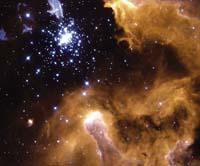Ratio between proton and non-constant electron masses

In the last 12 million years, the ratio between proton and electron masses has increased by 0.002%. This is what a group of astronomers and physicists have concluded after analyzing the light of two quasars with the giant telescope of Atacama (Chile). The discovery is fundamental because scientists considered the ratio constant between the proton and electron masses.
We analyzed the light of the quasars mentioned when passing this light through a cloud of hydrogen. The hydrogen molecule absorbs certain wavelengths of the light, so in those wavelengths of the electromagnetic spectrum, absorption lines appear. These lines form a kind of code whose position depends on the mass ratio of the proton and the electron. Subsequently, in the laboratory, a laser light and hydrogen molecules were used to simulate what was seen with the quasars. And they realized that the absorption lines were not in the same place, that is, that the ratio was not the same.
The authors of the study have promised to make thinner measurements. However, before they have realized that the constants were not constant, as is the case of the constant of fine structures, and therefore the theories of cosmology have not fallen.





